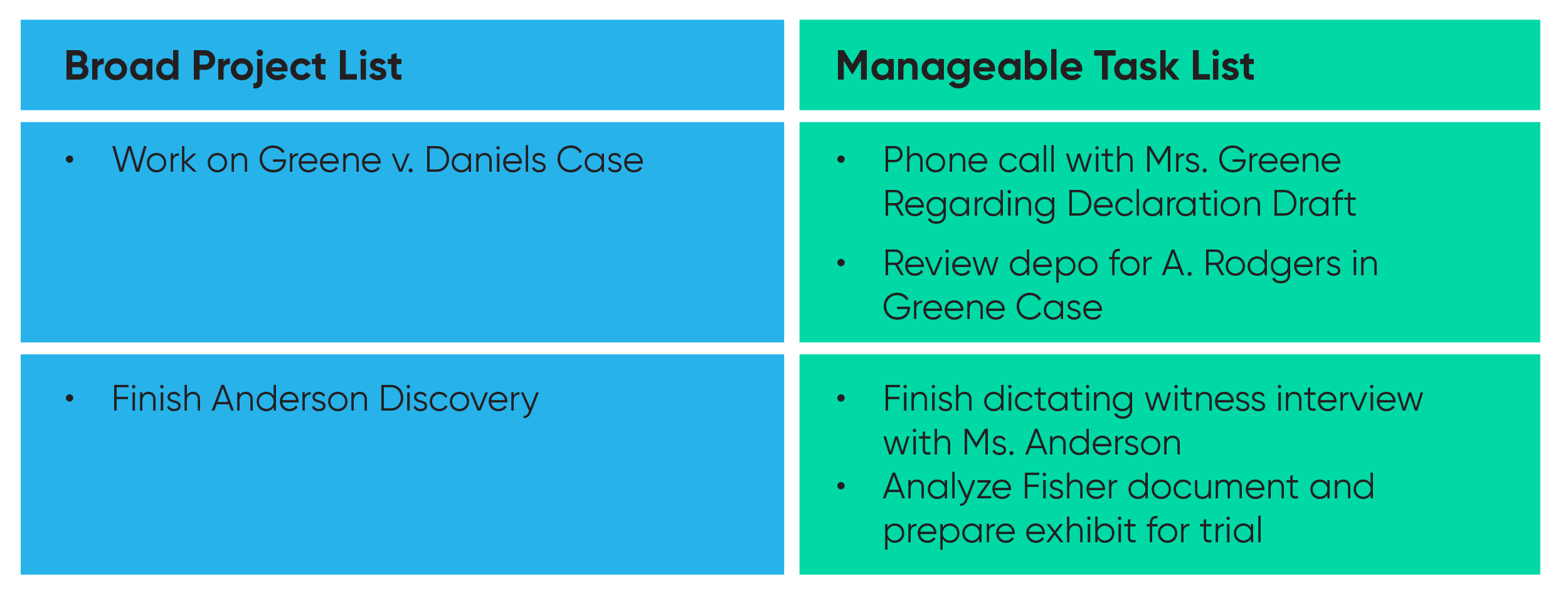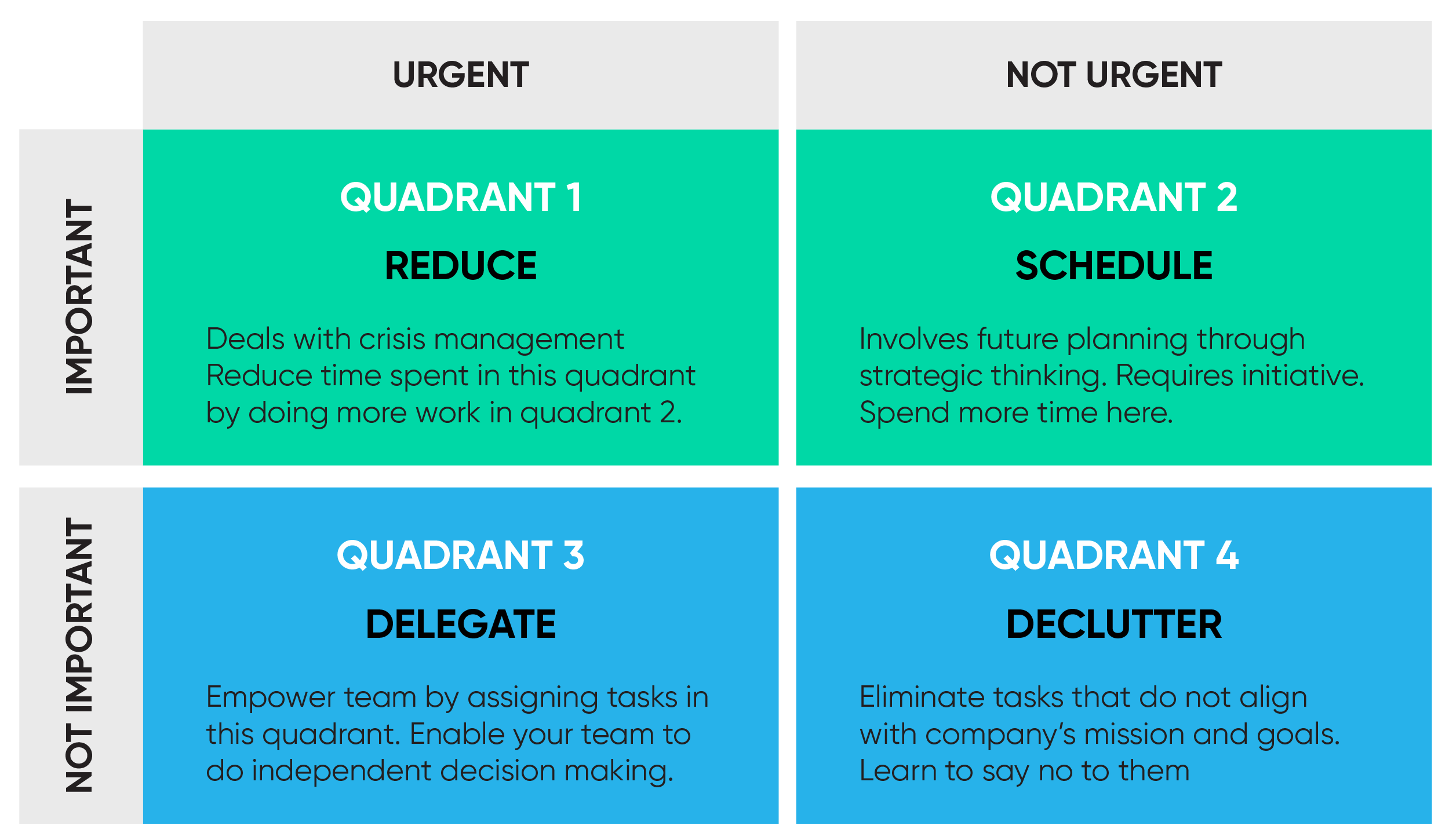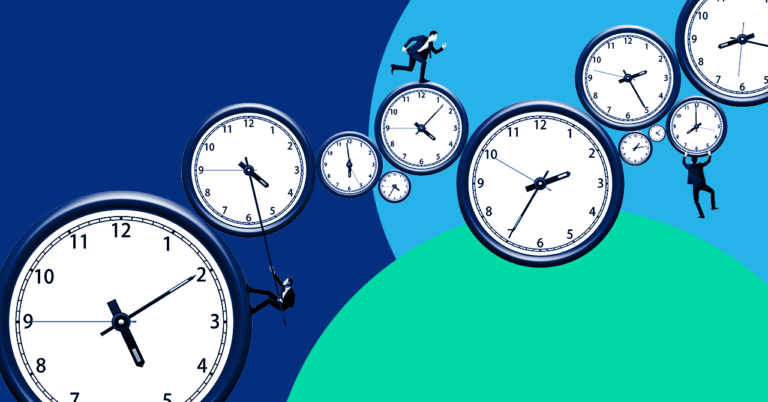Do you ever feel like there’s just not enough time in the day? Between managing complex cases, supporting busy attorneys, and battling a never-ending inbox, it’s easy to feel overwhelmed.
But what if you could reclaim those lost minutes and master the art of effective time management?
In this article, we’ll explore the top time thieves that plague legal teams, along with practical tips on how to prioritize tasks effectively, leverage technology to your advantage, and finally conquer that ever-growing caseload.
Set Yourself Up for Success
For legal support professionals, complex casework is just the beginning; drafting legal correspondence, maintaining client relationships, and handling attorney requests can make your day-to-day workload feel impossible to tackle.
But before you can develop better time management habits, you need to identify what’s stealing your time.
Maybe you’re guilty of prioritizing less important tasks over the more complex ones, a classic sign of procrastination. Or are you losing valuable minutes searching for specific legal documents in a disorganized system?
Recognizing these ‘time thieves’ is your first step towards effective time management. Without this, the idea of ‘effective time management’ becomes somewhat of a paradox.
If you find yourself rapidly shifting between tasks – responding to emails, drafting a legal memo, fielding client calls – you might want to find new ways to delegate some of those or adhere to a strict task list. If you’re a habitual procrastinator, consider tackling the most challenging tasks first. If the endless search for a client’s documents is slowing you down, perhaps it’s time to adopt a more efficient filing system.
So, the first step: know what works for you (or more importantly, what doesn’t) and use that understanding to create an effective strategy moving forward.
1. Start Tomorrow, Today: Compile a Next-Day Action List
One useful strategy to stay a step ahead is to create your task list for the next day at the close of your current day. Start prepping your casework and administrative tasks the night prior so you can dive straight into work from the moment you get to your desk.
To further improve your action list, break it down into tasks instead of projects. Converting your project list into a task list sets both daily and weekly goals, maintaining consistent productivity and efficiency.
Instead of writing down projects such as ‘Work on Greene v. Daniels Case‘ – which can be intimidating to look at – dissect it into discrete tasks like ‘Phone call with Mrs. Greene regarding Declaration Draft‘.

This approach transforms your vague projects into tangible and easily digestible goals.
Clearly defining tasks not only keeps you on track but also lessens the mental burden of deciding what needs to be done.
2. Embrace the Power of Modern Technology
In today’s fast-paced law office, knowing how to effectively use technology is not just an add-on skill, but rather a must-have that’s rapidly transforming the legal scene.
The good news is, there’s an endless amount of legal technology solutions and other software to make the legal industry’s fast-paced environment much more manageable. While most legal support pros are familiar with practice management systems like Clio, or document management systems like iManage, there are so many more productivity tools available today.
For the paralegal or support professional buried in busywork, AI-powered tools like CaptureNow and CaseText can handle everything from contract analysis and document review to basic secretarial duties. You may also consider exploring virtual legal assistant services to support you in case management, demand writing, collections and more.
But what’s more important for the legal community are the new and modern solutions specifically tailored for the busy legal professional.
For example, Rapid Legal’s portal, powered by LegalConnect®, the industry-leading litigation support service management platform, is used by thousands of legal professionals to have their litigation support services – eFiling, physical court filing, process serving, and more – fulfilled for their law firms and clients.
Whether it’s syncing invoicing data directly from Rapid Legal to your financial system, accessing documents from your document management or practice management system, leveraging our eFiling APIs to further streamline your firm’s electronic filing process, and more, modern law firms are now seeking Rapid Legal’s full technology capabilities and partnerships to achieve organizational efficiencies, reduce costs, and free firm resources for higher value work.
By embracing these innovative technologies, legal support professionals can reclaim precious time, focusing on what truly matters – supporting their teams, increasing billable hours, and achieving the best outcomes for clients.
3. Prioritize Your Tasks by Urgency & Importance
Effectively and strategically prioritizing your tasks is crucial for optimizing your productivity.
To help break down and organize your workload, consider using the Eisenhower Matrix. This reliable time management tool can help you sort tasks into four categories: urgent-important, important-not urgent, urgent-not important, and not urgent-not important.

Tasks that are both urgent and important, like a missing document needed for filing or responding to court orders on a deadline, demand your immediate attention. These are the duties that, if neglected, could lead to serious repercussions. Reduce the number of tasks in this quadrant whenever possible.
Similarly, important but not urgent tasks are those that align with your long-term objectives, like preventative tasks or legal research. Although they don’t need immediate attention, they shouldn’t be put on the back burner either. Plan ahead and schedule these tasks so they don’t slip through the cracks.
Tasks that are urgent but not important are some of the most common time thieves for legal support pros. Responding to low-priority emails, non-essential administrative tasks, answering minor client questions can all be considered urgent but not important tasks, ideal for strategic delegation.
Finally, tasks that are neither urgent nor important only serve to distract you and waste valuable time. If these tasks don’t align with the company’s mission, declutter your day and empower yourself to say “no.”
If used correctly, the Eisenhower Matrix is a powerful tool for managing legal tasks and your time, but it will take some effort to get started. Once you do, though, this method will surely help you maintain focus, reduce stress, and enhance your overall productivity.

4. Identify & Remove These Common Time Wasters
You’re not a legal support professional if you don’t find yourself grappling with time wasters such as redundant meetings, excessive email checks, and the lure of social media. All of these can really hamper your productivity, especially when they all hit you at once. Sometimes these time wasters are unavoidable, but there are a few tricks to minimize their disruption.
Before you RSVP to another meeting, assess the meeting’s purpose. Could the subject matter be shared via an email or a quick phone call? If so, don’t hesitate to suggest that alternative – the entire firm is better off when the right decision is made. Be confident you know what that decision is!
Constant interruptions in a busy law firm can derail your momentum. Between supporting attorneys, talkative coworkers, and multiple meetings, staying focused can be challenging.
The key to combating the “Interruption Impasse” lies in establishing clear boundaries. Communicate your availability to colleagues and consider utilizing “Do Not Disturb” functions on your phone or workspace. Don’t hesitate to schedule yourself some focus hours, minimize interruptions and make the most of your time.
5. Clear Your Desk, Clear Your Mind
You may think that a desk crowded with papers and sticky notes isn’t a big deal. But did you know that keeping your workspace physically tidy can also significantly improve your mental clarity?
Multiple studies* confirm the link between a clean, organized physical space and a clear, focused mental state. Just like a messy desk can cause stress and discomfort, a neat and tidy one can encourage concentration and efficiency.
Think of your desk as a reflection of your workload. If it’s cluttered, it can make it seem like your tasks are just as disorganized and chaotic. However, when your workplace is clean and clear, you are better equipped to handle your responsibilities in an orderly, systematic fashion.
This is also one of the easiest ways to start boosting your time management right away. Simply use the last 30 minutes this Friday to tidy and reorganize your desk for next week; before you leave each day, give it a quick once over so you can start every morning with a clean slate.
6. Busy Doesn’t Mean Productive: The Importance of Taking Breaks
Just as a neat desk can clear your mind, regular breaks can help you recharge. No one can operate at 100% efficiency at all times; our brains simply aren’t wired to stay focused for extended periods without rest.
You might be under the impression that continuous work equals increased productivity, but that’s a common misbelief. Whether you notice it or not, you might start to get mentally fatigued after your tenth straight client email, or the second hour of in-depth discovery. On the contrary, modern research underscores the significance of taking breaks for sustaining mental quickness and productivity. **
Neglecting to take time out can lead to mental fatigue, reduced productivity, and extended task completion times. It can even increase your risk of making a mistake and jeopardizing legal documents that need to be completed with steadfast accuracy.
Be it a five-minute break every hour, a healthy lunch break, or a 10-minute destress period, these moments are crucial for your mental health, brain function and overall productivity.
Final Thoughts: Time Management Tips for Legal Support Professionals
In the legal world, improving and optimizing your time management skills is an opportunity to achieve your tasks with speed, confidence, and impeccable execution.
Start by decluttering your physical space and addressing time wasters like social media and excessive emails. Harness modern legal solutions like Clio, AI services and Rapid Legal. Prioritize your task list with precision and give yourself some mental breaks to refresh and recover.
Remember, getting work done fast doesn’t mean you’re getting it done right, and being busy doesn’t mean you’re being productive!
It’s all about finding the right balance and time management strategy for you and your professional style.
After you put these tips to work, if you feel like you’re beginning to move ahead while your litigation support provider is falling behind, contact Rapid Legal for service and support that moves as quickly and efficiently as you. It’s time for you to work with a vendor that respects your time with unmatched performance and a satisfaction guarantee. Schedule a call today to speak to an account manager or book a demo.
